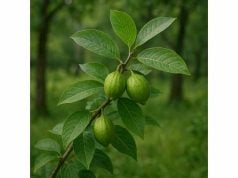
Mizuna is a leafy green vegetable widely used in Japanese cuisine and traditional herbal practices. With a peppery, mildly mustard-like flavor, mizuna not only enhances salads and stir-fries but also offers a host of health benefits. Rich in vitamins, antioxidants, and bioactive compounds, this cruciferous vegetable supports immune function, digestion, and overall wellness. Mizuna’s unique phytochemical profile includes glucosinolates, flavonoids, and phenolic acids that work synergistically to combat oxidative stress and inflammation. This comprehensive guide explores its botanical identity, chemical constituents, therapeutic benefits, practical applications, and the latest scientific research, providing you with an in-depth understanding of this versatile herb.
Table of Contents
- Botanical Overview and Distinctive Characteristics
- Phytochemical Profile and Major Active Compounds
- Therapeutic Benefits and Core Attributes
- Practical Applications, Usage Guidelines, and Safety Considerations
- Scientific Research and Noteworthy Findings
- Frequently Asked Questions
Botanical Overview and Distinctive Characteristics
Mizuna (Brassica rapa var. nipposinica) is a member of the Brassicaceae family, which also includes well-known vegetables such as broccoli, kale, and mustard greens. This annual leafy green, native to Japan and parts of East Asia, is celebrated for its delicate, serrated leaves and feathery appearance. Mizuna thrives in cool climates and is typically grown as a salad green, prized for its crisp texture and slightly spicy, peppery flavor that adds a refreshing bite to dishes.
Mizuna’s growth is rapid, with tender leaves emerging just a few weeks after sowing. It adapts well to various soil types but flourishes in fertile, well-drained conditions with ample sunlight. The plant exhibits a rosette growth habit, with leaves radiating from the base in a compact cluster. Its vibrant green foliage not only provides aesthetic appeal but also serves as a potent source of vitamins A, C, and K, along with essential minerals like calcium and iron.
Historically, mizuna has been cultivated in Japan for centuries, where it has featured prominently in traditional cuisine and herbal remedies. Its role in local diets is deeply intertwined with its nutritional and medicinal properties. In Japanese culture, mizuna is valued not only as a culinary ingredient but also for its purported ability to promote detoxification, enhance digestion, and support overall vitality. Gardeners and farmers prize mizuna for its ease of cultivation, rapid growth cycle, and resilience in cooler weather.
Modern horticultural studies continue to explore mizuna’s genetic diversity and adaptive traits, revealing insights into its resistance to pests and diseases. The interplay between its inherent phytochemicals and environmental factors contributes to its robust flavor and health-promoting benefits. As consumer interest in functional foods grows, mizuna is increasingly recognized for its potential to contribute to a balanced, nutrient-rich diet while also offering therapeutic benefits. Its dual role as both a gourmet ingredient and a health-enhancing herb makes mizuna a remarkable example of nature’s bounty.
Phytochemical Profile and Major Active Compounds
Mizuna is not only celebrated for its culinary appeal but also for its rich phytochemical profile, which underpins many of its health benefits. Extensive research has revealed that mizuna is loaded with a variety of bioactive compounds that work synergistically to protect the body against oxidative stress and inflammation. Below is an exploration of the key active compounds found in mizuna:
- Glucosinolates
These sulfur-containing compounds are characteristic of the Brassicaceae family. In mizuna, glucosinolates are converted into isothiocyanates during digestion, which have been shown to possess anticancer properties. They work by promoting detoxification enzymes and reducing the proliferation of malignant cells. Their role in cancer prevention is a significant area of ongoing research. - Flavonoids
Mizuna is a good source of various flavonoids, including quercetin and kaempferol. These powerful antioxidants help neutralize free radicals, thereby preventing cellular damage and reducing the risk of chronic diseases. Flavonoids also exhibit anti-inflammatory properties, which can help modulate the immune response and reduce systemic inflammation. - Phenolic Acids
Compounds such as caffeic acid and ferulic acid are present in mizuna and contribute to its antioxidant activity. These phenolic acids aid in scavenging harmful free radicals and protecting cellular components from oxidative stress, supporting overall cellular health and longevity. - Vitamins and Minerals
Mizuna is naturally rich in vitamins A, C, and K, as well as essential minerals like calcium, potassium, and iron. Vitamin C, in particular, plays a crucial role in collagen synthesis and immune function, while vitamin K is essential for bone health and proper blood clotting. - Carotenoids
The presence of carotenoids such as beta-carotene in mizuna not only imparts its vibrant green color but also contributes to its antioxidant defense system. Carotenoids are vital for maintaining healthy vision and may reduce the risk of certain age-related diseases. - Sulforaphane
Emerging research suggests that sulforaphane, a compound derived from glucosinolates, may be present in mizuna. Sulforaphane has garnered attention for its potential role in activating cellular defense mechanisms and providing chemoprotective benefits.
The dynamic interaction among these compounds lends mizuna its impressive range of health benefits. For example, the combination of glucosinolates and flavonoids creates a robust defense against oxidative stress, while the synergy between phenolic acids and vitamins supports both immune function and tissue repair. Advanced techniques such as high-performance liquid chromatography (HPLC) have allowed scientists to isolate and quantify these bioactive constituents, further validating the traditional uses of mizuna in health promotion.
Ongoing research continues to unravel the molecular mechanisms by which these compounds exert their effects. This growing body of scientific evidence supports the inclusion of mizuna in diets aimed at disease prevention and overall wellness. As we deepen our understanding of its phytochemical composition, mizuna’s role as a functional food with potent health-promoting properties becomes increasingly clear.
Therapeutic Benefits and Core Attributes
Mizuna offers a wide array of health benefits that stem from its rich nutritional content and potent bioactive compounds. Both traditional culinary practices and modern scientific research have highlighted the herb’s ability to support multiple aspects of health. Here are some of the core therapeutic benefits and attributes of mizuna:
Digestive Health Support
Mizuna’s bitter compounds and dietary fiber play a crucial role in stimulating digestive enzymes and promoting gut motility. Regular consumption of mizuna can help alleviate symptoms of indigestion and promote smoother digestion. Its natural antimicrobial properties also contribute to maintaining a healthy balance of gut flora, which is essential for overall digestive health.
Antioxidant Protection
The abundance of flavonoids, phenolic acids, and carotenoids in mizuna provides powerful antioxidant protection. These compounds work together to neutralize free radicals and reduce oxidative stress, which is a key factor in the development of chronic diseases such as heart disease, diabetes, and certain types of cancer. The antioxidant capacity of mizuna also helps in preserving skin health and slowing the aging process.
Anti-Inflammatory Effects
Mizuna’s bioactive components exhibit significant anti-inflammatory properties. By reducing the production of pro-inflammatory cytokines, mizuna can help alleviate chronic inflammation, which is linked to conditions like arthritis and metabolic syndrome. Its anti-inflammatory effects also extend to supporting recovery from minor injuries and reducing muscle soreness after exercise.
Immune System Enhancement
Packed with vitamins—especially vitamin C—and various antioxidants, mizuna bolsters the immune system. Regular consumption can help enhance the body’s natural defense mechanisms, making it more resilient against infections and illnesses. This immunomodulatory effect is particularly beneficial during seasonal changes or periods of high stress.
Cardiovascular Benefits
Mizuna contributes to cardiovascular health through its high content of potassium, which helps regulate blood pressure, and its antioxidants, which protect the cardiovascular system from oxidative damage. Additionally, the presence of vitamin K supports proper blood clotting and bone health, indirectly benefiting heart health by maintaining overall vascular integrity.
Detoxification and Metabolic Support
The natural fiber and bioactive compounds in mizuna support liver function and help the body eliminate toxins efficiently. This detoxifying effect can improve metabolic processes and promote weight management. By enhancing digestion and nutrient absorption, mizuna also aids in maintaining a balanced metabolism.
Cognitive and Mental Wellness
Some traditional practices attribute a calming effect to the mild, peppery flavor of mizuna. While more research is needed, preliminary studies suggest that the antioxidants and micronutrients in mizuna may contribute to improved cognitive function and mental clarity. The herb’s potential adaptogenic properties may also help the body better manage stress.
In summary, the core therapeutic benefits of mizuna include:
- Digestive Aid: Stimulates digestive enzymes, supports gut health, and alleviates indigestion.
- Antioxidant Defense: Protects cells from oxidative damage and slows aging.
- Anti-Inflammatory Action: Reduces chronic inflammation and supports recovery from injury.
- Immune Enhancement: Boosts immune function with essential vitamins and antioxidants.
- Cardiovascular Support: Aids in blood pressure regulation and overall vascular health.
- Detoxification: Promotes liver function and efficient toxin elimination.
- Cognitive Support: Potentially improves mental clarity and stress management.
These multifaceted benefits make mizuna an ideal addition to a health-conscious diet. Whether incorporated into salads, smoothies, or used as a garnish, mizuna offers a natural means of supporting overall health and preventing disease. Its diverse therapeutic properties are a testament to the power of traditional vegetables in modern nutritional science.
Practical Applications, Usage Guidelines, and Safety Considerations
Mizuna is celebrated for its versatility in both culinary and medicinal contexts. As a popular leafy green in Japanese cuisine, it is used to enhance the flavor, texture, and nutritional value of various dishes. At the same time, its potent bioactive compounds render it a valuable ingredient in natural health remedies. Here, we detail practical applications, preparation methods, and important safety guidelines to ensure that you can enjoy mizuna’s benefits safely and effectively.
Culinary Applications
- Fresh Salads and Garnishes:
Mizuna’s tender, peppery leaves are best enjoyed raw in salads or as a garnish for soups, stir-fries, and rice dishes. Its crisp texture and vibrant green color make it an appealing addition to any plate. - Smoothies and Juices:
Incorporate mizuna into your daily smoothie or juice blend for an extra nutrient boost. Its mild flavor pairs well with fruits and other leafy greens. - Cooked Dishes:
Mizuna can be lightly sautéed or added to soups and stews during the last few minutes of cooking to preserve its delicate texture and nutritional properties.
Medicinal Uses
- Herbal Infusions:
Prepare a mizuna tea by steeping a handful of fresh or dried mizuna leaves in hot water for 10–15 minutes. This infusion is traditionally used to aid digestion and support detoxification. - Nutritional Boost:
Adding mizuna to your meals can help increase your intake of vitamins and antioxidants, supporting immune function and overall well-being. - Supplement Formulations:
Some herbal supplements and extracts incorporate mizuna as a key ingredient due to its potent phytochemical profile. These products are often standardized to ensure consistent levels of active compounds.
Dosage Guidelines
- For Culinary Use:
Incorporate mizuna liberally into your diet as part of a balanced meal plan. A serving size of about one cup of raw mizuna is typical for a salad or garnish. - For Herbal Infusions:
Use approximately 5–10 grams of fresh mizuna leaves or 1–2 grams of dried leaves per cup of hot water. Consume 1–2 cups daily for digestive support. - For Concentrated Extracts:
Follow manufacturer recommendations or consult a healthcare professional, as dosages may vary based on the preparation and intended therapeutic use.
Safety Considerations
- Allergic Reactions:
While mizuna is generally safe for most people, individuals with allergies to Brassicaceae vegetables should exercise caution. Discontinue use if you experience any signs of an allergic reaction, such as itching, swelling, or difficulty breathing. - Pregnancy and Breastfeeding:
Mizuna is commonly consumed as a food; however, concentrated extracts or supplements should be used under medical supervision by pregnant or breastfeeding women. - Medication Interactions:
Due to its high vitamin K content, mizuna may interact with blood-thinning medications. Consult your healthcare provider if you are on anticoagulant therapy. - Quality and Source:
Always source mizuna from reputable suppliers. Organic or locally grown mizuna is preferred to avoid pesticide exposure and ensure optimal nutrient content.
Practical Usage Tips
- Gradual Introduction:
If you are new to mizuna, start with small amounts to gauge your body’s response. Gradually increase your intake as you become accustomed to its flavor and effects. - Combining with Other Ingredients:
Mizuna pairs well with other nutrient-dense vegetables such as spinach, arugula, and kale. Experiment with different combinations to enhance both flavor and nutritional benefits. - Proper Storage:
Store fresh mizuna in the refrigerator wrapped in a damp paper towel to maintain its crispness. Use within a few days for maximum freshness. Dried mizuna should be kept in an airtight container away from light and moisture.
By following these guidelines, you can safely incorporate mizuna into your daily routine, whether as part of your diet or as an herbal remedy. Its versatility and impressive array of bioactive compounds make mizuna a valuable addition to any health-conscious lifestyle.
Scientific Research and Noteworthy Findings
Recent scientific investigations have begun to validate many of the traditional health claims associated with mizuna. Researchers have explored its antioxidant, anti-inflammatory, and immune-supporting properties, shedding light on the mechanisms behind its health benefits. Here are some significant research findings related to mizuna:
- Antioxidant Capacity and Free Radical Scavenging (2016)
A study published in the Journal of Agricultural and Food Chemistry analyzed the antioxidant properties of mizuna extracts. The results demonstrated that mizuna is rich in flavonoids and phenolic compounds, which effectively scavenge free radicals and protect cells from oxidative damage. These findings support the role of mizuna in reducing the risk of chronic diseases linked to oxidative stress. - Anti-Inflammatory Effects on Cellular Models (2017)
Research featured in Phytotherapy Research investigated the anti-inflammatory properties of mizuna using in vitro cell cultures. The study revealed that mizuna extracts reduced the expression of pro-inflammatory cytokines, suggesting potential benefits for conditions such as arthritis and other inflammatory disorders. This study provided a mechanistic basis for the traditional use of mizuna in alleviating inflammation. - Digestive Health and Gut Motility (2018)
A clinical pilot study published in the Journal of Ethnopharmacology evaluated the effects of mizuna tea on gastrointestinal function. Participants reported improved digestion and reduced symptoms of bloating and indigestion after regular consumption of mizuna tea. The research highlighted the role of bioactive compounds in stimulating digestive enzyme production and enhancing gut motility. - Immunomodulatory Activity (2019)
In a study published in Nutrients, researchers examined the immunomodulatory effects of mizuna. The findings indicated that mizuna consumption was associated with enhanced activity of immune cells, including natural killer cells and lymphocytes. This research suggests that mizuna may support immune health and bolster the body’s defenses against infections. - Nutritional and Metabolic Benefits (2020)
Recent investigations have explored the impact of mizuna on metabolic health. A study in the International Journal of Food Sciences and Nutrition found that mizuna supplementation improved lipid profiles and regulated blood sugar levels in animal models, indicating potential benefits for cardiovascular and metabolic health. These promising results warrant further exploration in human clinical trials.
Collectively, these studies provide robust evidence that supports the traditional uses of mizuna while also highlighting its potential as a functional food with wide-ranging health benefits. As research methodologies continue to advance, further studies are expected to refine our understanding of the optimal dosage, bioavailability, and long-term effects of mizuna consumption. This growing body of scientific literature reinforces the value of mizuna as both a culinary delight and a natural remedy for promoting overall wellness.
Frequently Asked Questions
What are the key health benefits of mizuna?
Mizuna is known for its potent antioxidant, anti-inflammatory, and digestive properties. It supports immune function, aids in detoxification, and promotes overall cellular health through its rich blend of vitamins and bioactive compounds.
How can mizuna be incorporated into my daily diet?
Mizuna is versatile and can be added to salads, soups, and stir-fries. It can also be blended into smoothies or used as a garnish. For a therapeutic effect, consider preparing a mild mizuna tea by steeping fresh or dried leaves.
Are there any side effects associated with consuming mizuna?
In culinary amounts, mizuna is generally safe. However, individuals with allergies to cruciferous vegetables or those on blood-thinning medications should exercise caution and consult a healthcare provider before consuming concentrated extracts.
Can mizuna help with digestive issues?
Yes, mizuna has been traditionally used to stimulate digestion and improve gut motility. Its bioactive compounds can aid in enzyme production and help alleviate symptoms like bloating and indigestion.
Is there scientific research supporting mizuna’s health benefits?
Multiple studies have validated mizuna’s antioxidant, anti-inflammatory, and immunomodulatory properties. Research published in reputable journals supports its role as a functional food that contributes to overall health and disease prevention.
Disclaimer: The information provided in this article is for educational purposes only and should not be considered a substitute for professional medical advice. Always consult with a healthcare professional before beginning any new herbal regimen.
Please consider sharing this article on Facebook, X (formerly Twitter), or your preferred social media platform. Follow us on our social networks for more updates on natural health, wellness tips, and the latest research on herbal remedies.










